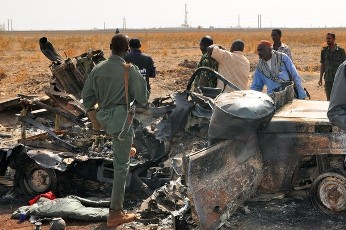Heglig’s oilfields unhurt by clashes, Sudan’s oil minister says
March 28, 2012 (KHARTOUM) – Three days of fighting between the armies of South Sudan and Sudan around the latter’s border area of Heglig have not affected its oil production despite “intentions” to do so, the country’s oil minister said on Wednesday.

“The oil wealth did not sustain any damage despite the persisting intentions [to do so],” he said, adding that the Sudanese army (SAF) would continue to protect the area in order to ensure that oil production remains intact.
Heglig produces 60,000 barrels of oil a day, accounting for almost half of Sudan’s daily output of 115,000 barrels. The area was attacked on Monday by the army of South Sudan, which took with it nearly 75 percent of Sudan’s former output of 500,000 barrels a day when it seceded in July last year.
In retaliation, Sudan’s army (SAF) bombed the main oilfields in South Sudan’s northern state of Unity on Tuesday.
However, what was starting to look like a return to full-blown war between the two sides eased on Wednesday after the southern army, known as the SPLA, said it halted engagement and withdrew south of the border. SAF, for its part, said it regained full control of Heglig.
Abdullah Suleiman, the Vice-President of the Greater Nile Petroleum Operating Co. (GNPOC), the China-led operator in Heglig, also said that the output is unchanged.
“The production facilities were not affected by the events. It’s normal business,” he said, as quoted by Reuters.
Suleiman told reporters that an oil field was shelled from the South Sudanese side of the border and that three people were killed in the blast. However, he said that oil export pipeline crossing the north-south border was not damaged.
Land-locked South Sudan shut down its oil production in January following a bitter row with Khartoum over the fees required to transport its oil via Sudan. Juba said the decision to halt production was prompted by Khartoum’s confiscation of oil in lieu of what Sudan claims are unpaid fees.
(ST)
